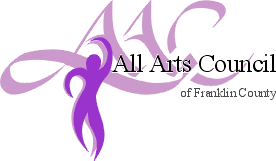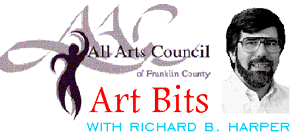

| VOLUME 6 | * * All Arts News On the Web * * | February 7, 2002 |
ArtBits always features a calendar of the goings on of Franklin County artists. Check out these events around Franklin County. Each issue includes the entire text of our weekly newspaper column. STUFF YOU SHOULDN'T MISS
Stop in for the AAC CoffeeHouses at 7 p.m. on the second and fourth Wednesday of every month. These gatherings bring new opportunities, gossip, "show-and-tell" and workshops. We come together on the second Wednesday for a booked musical performance and an art exhibit at Simple Pleasures in St Albans. On the fourth Wednesday come to the Kept Writer in St Albans for acoustic Open Mike Night featuring music, readings, and more from the best new artists in Vermont.
Old joke: DON'T QUIT YOUR DAY JOB
Q: How does a jazz musician make a million dollars?
A: By starting out with two million dollars.
"If music is going to be your thing, you have to do something" else, said AAC board member, teacher, and accompanist Melissa Ewell. "It's pretty unusual for a musician to support himself or herself just as a performer in this neck of the woods."
This is the first of a series of columns in which we will look at jobs in the arts, at what is available and at what cost. I will cover writing, the visual arts, and dance in future issues. This might turn in to a good primer if you are beginning to consider (or still thinking about) running away to join the circus.
Here in Vermont, a music career needs dedication and a willingness to have some other source of income or to live very frugally. For every Trey Anastasio, there are a hundred respected, successful Vermont performers like Jim Duncan, MD (VSO), teacher Rob Guerrina (Just Jazz), surveyor Will Patton (Red Wing), and station manager Nobby Reed (Nobby Reed Project), performers who work regularly in the music business but who also have a day job.
People who love music can find careers in composing, sound engineering, presenting, instrument making, the "back office" support, and performing. Others use music to underpin a different career, including music therapy, research, and teaching.
Almost everyone starts with the dream of performing. You want to be a Bare Naked Lady, or Garth Brooks, or Kiri Te Kanawa, or Rod Stewart, or Wynton Marsalis, or to sing at the Super Bowl with Terry Bradshaw (in case you missed the half time show, another famous musical person--Paul McCartney--and Bradshaw performed an impromptu duet).
"I love the music," Nobby Reed said, "but we travel a lot for gigs." They play regularly in South Hero, Cambridge, Newport, Burlington, as well as several venues in New Hampshire, Massachusetts, and beyond. They played the Maple Festival, Field Days, Swanton Festival, and Summer Sounds last year and will perform on the main stage at Ben & Jerry's One World Festival this year.
"The [popular] music business is all dollars and image, not talent and ability," Mr. Reed said.
Classical performers usually work in an orchestra or ensemble and give private lessons. Our recent profile of the Klimowskis showed that is feasible in Vermont, given talent, perseverance, and business acumen.
The falling prices of studio equipment mean performers in all genres can self-publish CDs and tapes. Some performers find work in studio gigs. That requires professional music reading skills and flexibility. A studio musician must sing or play on demand in the key or style of the day. Pop, folk, and jazz musicians often play in concerts, weddings, and bars. Musicians also find paid and unpaid work in local musical theater productions.
Attorney and bass/baritone George Harwood sings in the Vermont Symphony Orchestra Chorus, the Burlington Choral Society, and his church choir. He started singing as a boy and was paid as a boy chorister in New Jersey, sang through high school and in the Rutgers Glee Club and Rutgers University Choir.
"It's much easier and much more fun to be an amateur," he said "It's easier because you don't have the pressures of solo performance, of how to make a buck, and the constant scrambling for jobs."
The time demands for rehearsals and for personal practice are far greater for professional vocalists. There is constant travel. And singers worry about the voice. "You always wonder as you turn 50 how it's going to hold up," Mr. Harwood said. "I'm pleased with my singing now. In some ways, the more you sing, the more you improve technically. "There are great people involved in the amateur choral scene. You meet with 100 other people who share your interest in music and enjoy making music." Although it would seem hard for composers to make a living at music here, Vermont seems to be a magnet for composers. Carol Abair, Alex Abele, Jon Gailmor, Laura Koplewitz, Ken Langer, Karen McFeeters, Thomas Read, and Gwyneth Walker are well known in Franklin County. "Working composers look for commissions from performing groups like the VSO or the Constitution Brass and for school or college residencies to bring in that regular paycheck," Ms. Ewell said. And they can sell their work anywhere in the world.
Charlotte composer Alex Abele wrote The Soldier's Tale for the VCME. Mr. Gailmor will lead the Red Clover composition project in April at Swanton Elementary. The VSO commissioned Laura Koplewitz to write Lake Spirit Journey for their concert in St Albans. Counterpoint premiered arrangements of four Vermont folk songs by Ken Langer. Earlier VSO programs have featured composers Thomas Read and Gwyneth Walker. St Albans native Karen McFeeters and Vermont State Song competition finalist Carol Abair were popular vocalists in Summer Sounds last season.
Composers also create the background music for the advertising you hear on local radio commercials; local performers record it. Composers can write musical scores for video games as well as for movies, theatricals, and television. Ms. Koplewitz teaches SUNY-Stony Brook and Goddard College; Mr. Langer teaches at Lyndon.
There are a number of jobs to bring the performer to the audience. Music needs recording engineers and producers, broadcasters, agents and promoters, and people to staff the record stores. All Arts Council volunteers book dozens of performers into local venues.
Some academics study and write about music either for the popular press in reviews and in the discipline. Reviewers need a broad knowledge and a good ear. Musicologists need a broad knowledge, research skills, and a very focused expertise in a subject area such as Baroque composers.
Teachers like Ms. Ewell see 700 students each week in the classroom. Her Swanton counterpart Anna Perkins also teaches private lessons. Rob Guerrina retired last year after teaching for 30 years. He has maintained a regular jazz group, solo gigs, and has freelanced throughout Vermont and around the country. Alfred McEwen's CD, For the Love of Sean, features Mr. Guerrina, Paul Asbell, and Will Patton.
In between concert dates, Nobby Reed manages bookings, hires musicians, orders materials, and advertises the band. "I've always been a musician," he said. "I picked up a job that I thought would be a part time thing, but I've been there for 10-12 years. You have to self-manage your career and spend a fair amount of time doing the non-music stuff."
"To be a classical musician here, you need to keep finding challenging things to play to keep your skills up," Ms. Ewell said. "That's harder to do here than in New York City because as an accompanist, I need a partner, a performance venue, and music that is specifically written for both instruments."
Like so many other occupations, music requires "only" business skills, training, talent, experience, and above all a willingness to do the job.
MUSICAL TEACHERS YOU SHOULDN'T MISS
ST ALBANS--The funk/jazz/blues combo Turning Point with Eric Bushey, guitar, Justin Bedell, bass, and Craig Benson, percussion, plays the Kept Writer, Friday at 7 p.m.
FAIRFAX--Mark Sustic leads acoustic instruments, and (mostly) traditional music at 1:30 p.m.-4 p.m. Saturday at the Foothills Bakery..
There are probably a bazillion websites devoted to making a living in music. Here is a sampling of the choices. CLICK HERE: ART SITE OF THE WEEK
The AAC Art Links page lists festivals and calendars for your gigs, music related newsgroups and web-sites plus other resources.
The Bards Crier offers free music marketing articles.
Bob Baker has a warehouse of free music marketing articles.
Berklee College of Music describes careers in performance, songwriting, music production and engineering, music synthesis, film, contemporary writing, music education, business, and more.
The MENC Careers in Music brochure gives an overview of music careers in ten areas and more than fifty specialties. It was originally published in 1989.
The Music Industry Career Center has want ads from dozens of music industry companies.
ArtBits features a quick weekly peek at the bookshelf or night stand of the folks you know in and around Franklin County. That popular feature has a page of its own at the Franklin County Bookshelf here on the AAC site. FRANKLIN COUNTY BOOKSHELF

Dick Harper, Chair
P.O. Box 1
Highgate Springs, VT 05460
email us
|
This article was originally published in
the St Albans Messenger and other traditional print media. It is
Copyright © 2002 by Richard B. Harper. All rights reserved.
Archival material is provided as-is. Links are not necessarily maintained
(if a link in this article fails, try Google.com or your favorite search engine). Thanks to recent misuse of copyright material on the Internet by individuals and archival firms alike, we emphasize that your rights to this article are limited to viewing it and printing it for personal use only. You must receive explicit permission from the All Arts Council and the author before reprinting or redistributing this article in any medium. |